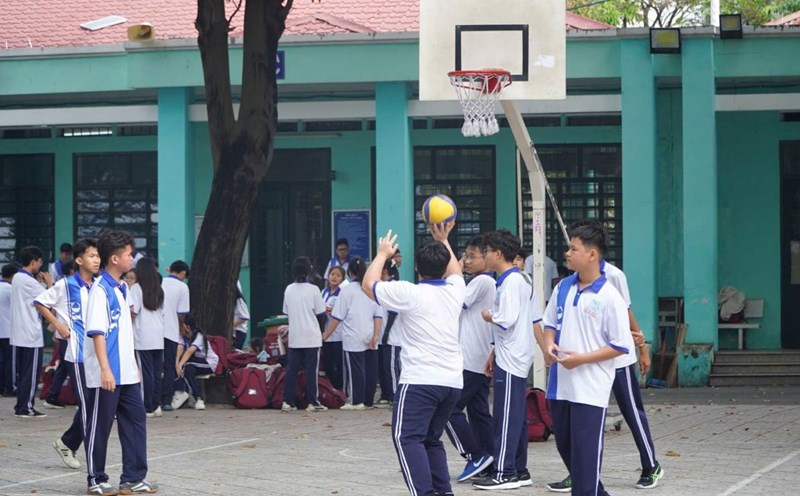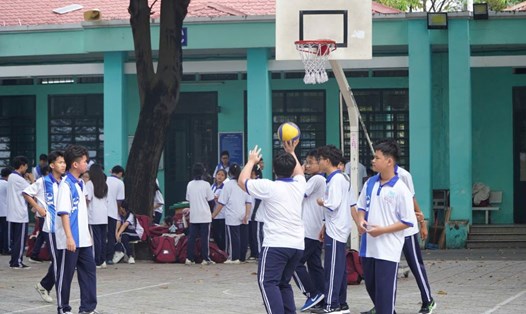The stadium is bustling with sports and arts
Implementing the regulation "Do not use phones in school, even during recess" from the 2024-2025 school year, Mr. Dang Van Thanh - Vice Principal of Thanh Loc High School - said that after many years of observation, instead of exchanging, mobilizing or participating in group games, most students spend all their recess on their phones. That reduces direct interaction, limits sports activities, and even causes negative behaviors on social networks such as defaming and insulting friends.
"We discussed in the pedagogical council, collecting opinions from teachers, parents and students. The majority are in favor and want change. To ensure communication when necessary, the school arranges public phone numbers at the on-duty office, sends management staff so that students can call their families or parents for emergencies and can easily contact them when needed," said Mr. Thanh.
He added that in parallel with banning the use of phones, schools will invest in building many alternative activities. The stadium is arranged with space for volleyball, soccer, badminton; corners for cultural activities, singing, dancing, dancing; sports and art clubs are active. The library is equipped with modern computers for students to research documents, study in groups, and discuss. Thanks to that, playing time becomes bustling, dynamic and rich in creativity.
"The initial results are very positive. In class, students are more focused and proactive, with a relaxed spirit after being exercised. During recess, children are more connected, participate in many collective activities, and limit conflicts online. Many children share that now they are more happy, have new friends, and no longer feel lonely. Some children who were already passive have now found joy in sports and the arts," Mr. Thanh shared.
Similarly, Ms. Pham Thi Phuong Hong - Principal of Nguyen Thai Binh Secondary School said that the school has implemented a "happy happy hour" model.After a year of application, the model received high consensus from parents and positive responses from students.
According to Ms. Phuong Hong, instead of using phones during breaks, students are encouraged to participate in many rich activities such as sports, folk games, chess clubs, arts, reading at green libraries or taking care of the class's gardens.
"The psychology of some students was not initially used to not having a phone by their side, however, the homeroom teachers often listened and coordinated with parents to support and relieve their worries. Up to now, after one year of implementation, almost 100% of parents have agreed. Students have more opportunities to connect, connect, and limit conflicts arising from social networks. The school's discipline is also more stable and active thanks to that", Ms. Phuong Hong shared.

Phones should only be used for necessary learning and communication
Mr. Nguyen Van Hieu - Director of the Department of Education and Training (DET) of Ho Chi Minh City - said that in the context of science and technology development, mobile phones have become a part of life. Even students are in great need of this device to communicate with their parents and support their studies. However, if used uncontrollably, the phone can cause dependence and negatively affect the development of children.
Mr. Hieu cited that in recent times, there have been many cases of students being scammed online. With just simple tricks, bad guys have penetrated the personal information of students and families. Some students are lured to dangerous locations, even leaving the area, becoming victims of criminal networks. Some cases were detected and rescued by the police in time, but there were also cases that left heartbreaking consequences.
To prevent this, many schools have applied different measures: From propaganda, coordinating parents to disciplining students. However, according to Mr. Hieu, each school has different conditions and methods of doing things, and the effectiveness is not uniform.
The Department's viewpoint is not to absolutely prohibit students from bringing phones to school. However, phones should only serve essential needs, support learning, and communication when needed. We should not be too camorious, but must orient them to proactively use them reasonably, safely, and without dependence," Mr. Hieu emphasized.










